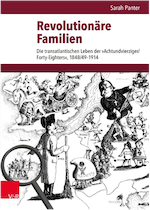News
01.09.2025
New publication: „Revolutionäre Familien“ – Ein neuer Blick auf transatlantische Leben deutscher Revolutionsflüchtlinge
 175 years after the failure of the German Revolution of 1848/49, the fates of German revolutionary refugees are still told as two separate lives: on the one hand, the lives of failed revolutionaries forced to flee Europe; on the other, the lives of German Americans, the so-called “Forty-Eighters,” who fought for the abolition of slavery during the American Civil War.
175 years after the failure of the German Revolution of 1848/49, the fates of German revolutionary refugees are still told as two separate lives: on the one hand, the lives of failed revolutionaries forced to flee Europe; on the other, the lives of German Americans, the so-called “Forty-Eighters,” who fought for the abolition of slavery during the American Civil War.Sarah Panter's hot-off-the-press postdoctoral thesis “Revolutionary Families: The Transatlantic Lives of the ‘Forty-Eighters,’ 1848/49–1914” offers an innovative perspective on the connection between family, mobility, and political self-image in transatlantic migration.
The overarching research question of the project addresses the significance of “family” for the agency of German revolutionary refugees during transatlantic migration in the “long” 19th century.
The analysis of the transatlantic lives of German revolutionary refugees shows that mobility, family, and political self-image were closely linked and can only be understood in their interaction. By taking into account multiple affiliations, cross-border mobility potentials, and revolutionary self-presentations, the study makes it possible to confront abstract basic assumptions about the group of political refugees with their individual experiences. This offers new insights into migration, political, gender, and generational history that can help to understand current challenges and opportunities for migration societies and democracies.
PD Dr. Sarah Panter is a research associate at the Leibniz Institute of European History (IEG) and teaches as a private lecturer at Johannes Gutenberg University Mainz.


